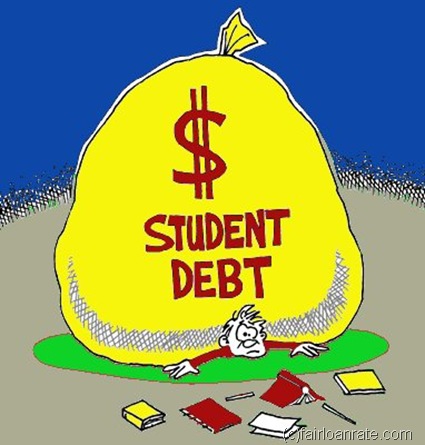Catch at Age 22
April 15, 2010 • By Christina Valladares
 CATCH 22 – College
grads sink further into the ocean of student loan debt. Will Obama’s
recent provision to the health care bill be the life raft?
CATCH 22 – College
grads sink further into the ocean of student loan debt. Will Obama’s
recent provision to the health care bill be the life raft?Growing up you might have heard that education is the key to success. What you weren't told is that you might be one of a million Americans struggling to pay off the debt that comes with an education. With a growing number of students relying on student loans to finance their schooling, grads are likely to enter the workforce with both a diploma and a sack of debt in tow that keeps them in a hole for years, even decades.
Last month, President Obama signed a provision in the healthcare bill that may help students acquire Pell Grants with more ease and for lower interest rates.
The provision eliminates fees paid to private banks to act as intermediaries in providing loans to college students. The intention is to use much of the nearly $68 billion in savings over 11 years to expand Pell Grants and make it easier for students to repay outstanding loans after graduating.
The Pell Grant expansion would raise the maximum grant to $5,975 from $5,550. The law also invests $2 billion in community colleges over the next four years to provide education and career training programs to workers eligible for Trade Adjustment aid.
Yet, will this new law offer young adults an alternative to one that's solely made up of paying debt?
Frankly, today's college tuition has been the highest it's ever been.
According to Sallie Mae Student Loans, undergraduate loan debt has increased significantly since 1997, displaying a 66 percent
 increase on average from $11,400 to $18,900. The average cost of an undergraduate degree from a Florida public university is about $15,000.
increase on average from $11,400 to $18,900. The average cost of an undergraduate degree from a Florida public university is about $15,000. For advanced degree-seeking students, many worry that the debt load is more than they can handle. Graduate student Isabel Scalise is anxious about how she will pay back her student loans upon receiving her M.A. in Business Administration from Nova Southeastern University.
"I don't know if I'll be able to pay my $35,000 debt back consistently in the future if something were to happen with my job situation," said Scalise. "My loan is variable interest and that is scary for me."
A variable interest rate loan is where the interest rate charged on the outstanding balance varies as market interest rates change.
So, say you owed $30,000 with an initial rate of 6.8%. The least you'd have to pay is $345 a month and it would still take you ten years to pay off. If the interest rate changes based on how poorly the Yankees are playing or any other ridiculous market change, it may take you twice as long.
 New York resident Jessica Perez is one of the many college graduates struggling to pay off the $30,000 debt that she acquired upon graduating from Miami International University of Fine Arts.
New York resident Jessica Perez is one of the many college graduates struggling to pay off the $30,000 debt that she acquired upon graduating from Miami International University of Fine Arts."I wish the government could help me out of my $30,000 loan like they helped the biggest financial institutions out of their debt," Perez said. "I just feel like I'll be paying it back forever."
Student loans are not the only debt that Americans find burdensome.
Americans hold almost $1 trillion in credit card debt, according to The Washington Post. And guess who have been their easiest and most gullible prey? College students. They are the most inexperienced in credit management and debt, according to a recent USA Today survey.
Miami native Jenny Herrera relies on credit cards to help her cover unexpected expenses such as medical bills and car repair. However, using credit cards are usually followed by high interest rates and hidden fees.
"You always end up paying more than what you owe," said Herrera.
It was only last May that Obama put an end to the predatory practices of credit companies on places like college campuses.

According to the Credit CARD Act of 2009, issuers are now prohibited from issuing credit cards to anyone under 21 unless the applicant can produce either proof of sufficient independent income to pay off the loan or a willing co-signer who is over 21.
Things like credit cards with "teaser" interest rates, sub prime mortgage loans and high interest signature loans have been the kind of predatory practices that victimize young adults.
Zachary Knowles, executive account manager at Bulk Debt Solutions located in Ft. Lauderdale, Fl, believes in educating people on how to identify predatory loans.
"The average household owes $8,000 - $12,000 in unsecured debt," said Knowles. "And, in the past ten years, 85 percent of loans processed had government infractions and had some kind of predatory practice."
His company relieves their clients from overwhelming financial obligations by establishing relationships with vendors providing software and banking services, allowing them to leverage large groups of client debt to a single credit servicer in one settlement offer of a 40-60 percent reduction and zero interest rate.
 All settlement offers must first be accepted or declined by the client enrolled in the program.
All settlement offers must first be accepted or declined by the client enrolled in the program.All in all, if you thought you have had it bad, you're in good company.
Barack Obama earned his political science degree from Columbia University in New York in 1983 and graduated from Harvard Law School in 1988. It would be a long time before Obama could pay off the debt he accumulated from his ivy league education.
"I went to college having to take out student loans, went to law school having to take out student loans. Michelle took out student loans. When we got married, I think together our total loan payment every month was more than our mortgage when we bought a house, and that lasted for about 10 years," Obama stated in an interview with MTV while he was running for president.
What hope is there for the rest of us? Obama's new bill will tell.
For more information and to take advantage of Bulk Debt Solutions' free credit repair offer for NEWD readers, contact 866-288-3028.
Related Articles · More Articles

